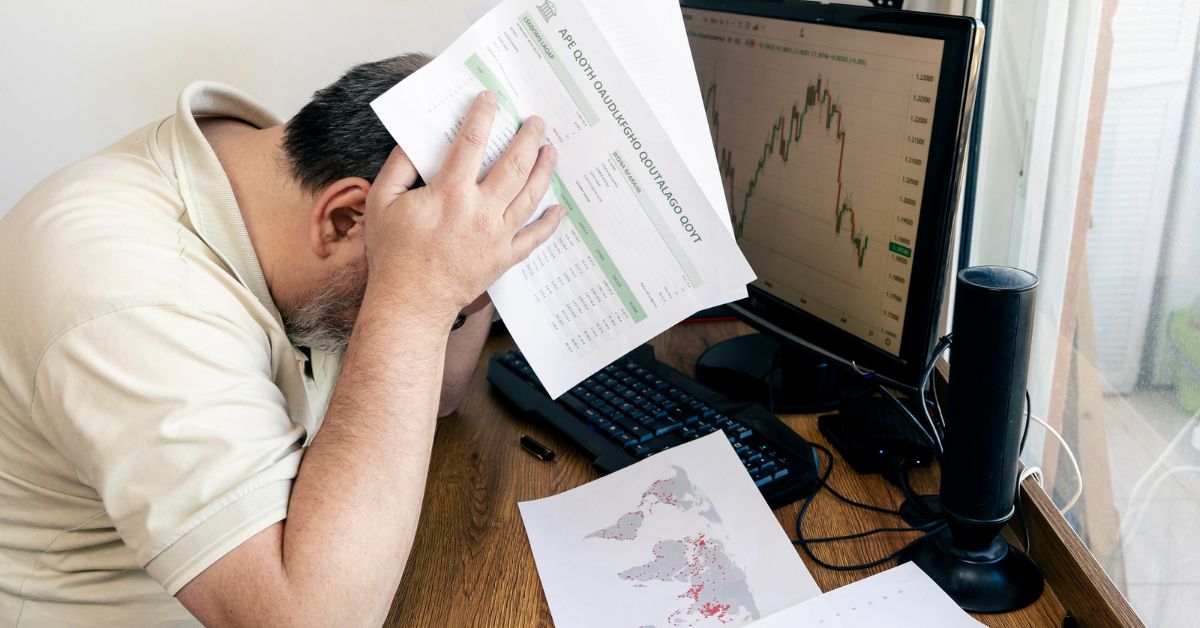Do traders get bored? Many in the financial world often wonder about this question. Trading, while potentially lucrative, can become monotonous over time. The repetitive nature of analyzing charts, monitoring market movements, and executing trades can take its toll. The key to staying focused and performing is understanding and dealing with boredom.
Boredom in trading can lead to decreased motivation, distraction, and even risky behavior. Traders must recognize the signs early and take proactive steps to combat them. In this article, we’ll explore the causes and effects of boredom in trading and provide strategies to stay engaged and successful.
Prime XBT, a reliable crypto trading platform, offers a variety of resources and tools to keep traders engaged. With its advanced charting tools and diverse trading options, Prime XBT helps traders stay interested and active in the market. So, join PrimeXBT today! Use promo code PRIMEOTT to receive a +7% bonus on your deposit.
What is Trading Boredom?

Trading boredom refers to a lack of excitement during the trading process. It often stems from repetitive tasks like monitoring markets and executing the same strategies daily. This routine can feel monotonous, leading traders to lose interest. The constant repetition of similar activities is a major characteristic of trading boredom.
Trading during low market activity periods can lead to boredom, as traders aren’t getting the excitement or the challenges they thrive on. This feeling can trigger a need for instant gratification or risky behaviors, leading traders to act impulsively. For some, this means seeking distractions, while for others, it means taking unnecessary trades to break the monotony.
According to experts, boredom in trading can push individuals to act outside their strategy just to “feel something,” risking their portfolio in the process.
How Trading Environment Leads to Boredom
The environment in which trading happens can significantly influence a trader’s experience. During periods of low volatility, such as a quiet market or a narrow trading range, there may be few opportunities to engage actively.
These quiet periods can frustrate traders who are used to the excitement of volatile conditions. Traders may lose focus without the usual market activity, leading them to take unnecessary risks or abandon their trading plans.
Creating a routine and setting clear boundaries for trading hours can help manage boredom. Some traders structure their time by setting aside periods to review their past trades, analyze market trends, or improve their strategies. This can prevent boredom from setting in during market lulls and keep their skills sharp for when the market becomes more active.
The Impact of Boredom on Mental Health
Boredom can lead to more than just a lack of focus; it can also damage a trader’s mental health. When boredom is prolonged, it can contribute to stress, anxiety, and burnout. People who feel bored at work tend to be more stressed and make impulsive decisions they regret later.
In trading, these impulsive decisions might lead to significant financial losses. Traders need to manage their mental health and develop strategies to cope with boredom.
Why Do Traders Get Bored?
Boredom in trading is common, especially when traders spend long hours monitoring the markets. The monotony and repetitiveness can make trading feel more draining than exciting. Here’s a look at some primary reasons for boredom in trading:
Market Conditions: The Effect of Low Volatility
Traders often become bored during periods of low market volatility. When prices are stable or fluctuate within narrow ranges, opportunities for trades become scarce, leading to long waiting periods for favorable conditions. This inactivity can cause boredom, as traders find themselves staring at screens, waiting for the slightest movement that may take hours or days to materialize.
During these periods, traders need to practice patience rather than taking unnecessary risks. It is important to avoid “action bias,” where a desire to move takes precedence over logical decision-making. This careful approach can prevent losses during unexciting market conditions.
The Repetitive Nature of Trading
Trading routines involve repetitive tasks—analyzing charts, reading market news, and making similar decisions each day. This routine can become monotonous, especially for traders who seek variety or excitement.
Although each trading day is unique, the process often follows a familiar pattern, which can lead to mental fatigue. One way to manage this repetitiveness is to introduce occasional changes, such as exploring new strategies or markets. Adding variation to trading can help break the monotony and keep traders engaged.
Human Need for Excitement and High Expectations

Trading is often portrayed as a high-stakes, adrenaline-fueled profession, especially in movies and media. This creates expectations of constant action and quick gains, but real trading involves long waiting periods and disciplined decision-making.
New traders may initially seek excitement in the market, only to be disappointed by its calmer reality. Over time, traders realize that success requires patience and self-control more than constant action. It can reduce the excitement of trading, making it feel less thrilling.
Comparing Trading with Active Professions
Unlike more active jobs where physical involvement or direct interactions are part of daily tasks, trading is a largely solitary and screen-focused activity. It’s hard to stay engaged in a passive career, especially when you’re not involved in physical activity or social interactions. This contrast can make trading feel unengaging, with its passive, slow nature adding to the sense of boredom.
How to Embrace Boredom in Trading?
Experiencing boredom in trading is common, especially when trades require patience or markets move slowly. Here are some strategies to keep engaged without jeopardizing discipline.
1. Accepting Boredom in Trading
Boredom can play a significant role in disciplined trading. It often indicates that a trader’s system is well-structured and efficient. When traders recognize boredom as a sign of stability, they can benefit from its discipline-building effects.
2. Developing Patience and Discipline
Patience is a crucial component of successful trading. Developing this trait helps traders handle market fluctuations without making impulsive decisions. Techniques such as meditation, deliberate practice, and setting clear goals can aid in building and maintaining trading discipline.
3. Learning from Market Down-Times
When the market is slow, it’s a great time for traders to focus on learning and improving. Instead of getting bored, traders can look back at past trades to see what worked and what didn’t. They can study different patterns in the market, test new strategies using old data, or practice with demo accounts.
What are the Risks Associated with Boredom in Trading?
Here’s a clear breakdown of the risks associated with boredom in trading, along with how it can impact decision-making and focus:
Overtrading: Placing Trades Out of Restlessness
When boredom creeps in, traders may feel compelled to make unnecessary trades just to fill the time. This can lead to overtrading, where the urge to stay active in the market results in high-risk positions that may not align with a well-thought-out strategy.
Putting too many trades with low potential can increase transaction costs, expose traders to additional risks, and ultimately reduce profits.
Risky Behaviors: Impulsivity and Altered Strategies
Boredom can also drive impulsive decisions, such as increasing the size of trades or making sudden changes to trading strategies.
These behaviors arise as traders seek excitement or a sense of accomplishment, but they can lead to significant financial loss. Maintaining a disciplined approach and sticking to a trading plan is essential to avoid these temptations.
Distractions: Loss of Focus and Missed Signals

To combat boredom, traders may turn to social media, browse other websites, or even multitask. While these activities might feel like harmless diversions, they can severely impact concentration. Missing critical market signals or overlooking chart patterns due to distractions can compromise a trader’s performance. Strategies to combat these distractions include setting specific times for trading and avoiding activities that pull attention away from the market.
Practical Tips for Avoiding Boredom
Here are some tips to minimize your boredom in trading. Such as:
1. Set Small, Achievable Goals
Having clear goals can add purpose to your trading routine. Define achievable daily or weekly targets—like learning a new chart pattern or practicing risk management.
Track your progress through a journal or log, noting what worked and what didn’t. This record gives you something concrete to review, highlighting your growth over time and reinforcing positive behaviors, keeping boredom at bay.
2. Create a Side Project
Consider dedicating some time to side projects related to trading, like testing a new strategy in a demo account or exploring another asset class. Experimenting in a low-risk environment can make trading more engaging by introducing variety. Testing strategies without real financial consequences lets you learn in a hands-on way, helping to broaden your skills while maintaining interest.
3. Take Short, Structured Breaks to Recharge
Regular, brief breaks are essential for mental clarity, especially when markets are stagnant. Follow a schedule, like the Pomodoro Technique, where you work for a set period and then take a short break.
Use these breaks to exercise, meditate, or do something unrelated to trading. These quick resets refresh your mind, reducing mental fatigue and lowering the temptation for impulsive trades.
4. Change Your Trading Routine
To keep things interesting, vary your trading approach. Explore different asset types—such as forex, commodities, or cryptocurrencies—or experiment with new techniques, like swing trading or scalping.
Diversifying your trading can challenge your skills, helping you learn and stay engaged. This not only reduces boredom but can also make you more adaptable and knowledgeable in different market conditions.
5. Join a Trading Community
Engaging with other traders, either online or in local groups, can offer new perspectives and keep things stimulating. Share ideas, discuss strategies, and learn from others’ experiences.
This interaction reduces the isolation that trading sometimes brings and provides a support network, keeping you connected to a broader community. The exchange of insights can also help you grow and add a social element to your trading routine.
6. Focus on Continuous Learning

The financial markets are always evolving, and there’s always more to learn. Dedicate time to studying new techniques, reading books, or taking courses on market analysis and trading psychology.
Each week, challenge yourself to learn something new, like a technical indicator or an advanced trading strategy. Expanding your knowledge keeps your mind sharp and engaged, helping you stay enthusiastic about trading.
7. Adopt Physical Activity for Mental Clarity
Spending extended hours in front of screens can cause mental fatigue and restlessness. Incorporate physical activity into your day, whether it’s a morning workout, a walk, or yoga.
Physical exercise improves mental clarity and releases endorphins, which boost mood and energy levels. Returning to your trading desk with a refreshed mind can make it easier to stay focused and resilient against boredom.
8. Plan and Schedule Downtime Away from Trading
Taking time off is essential for maintaining a long-term trading interest. Schedule regular days off or even vacations to reset your mind.
When you return, you’ll have a fresh perspective, helping you view trading sessions as opportunities rather than chores. This downtime can make the trading experience more enjoyable and prevent burnout.
9. Practice Mindfulness
Mindfulness techniques, such as meditation or deep breathing, can help manage stress and improve focus. Spend a few minutes before trading or during breaks practicing mindfulness exercises.
These techniques help you stay centered, reducing anxiety and restlessness. Over time, mindfulness can improve your emotional resilience, making trading a calmer, more engaging experience.
10. Establish a Reward System for Achievements
Setting up a reward system can add excitement and motivation to your routine. For example, treat yourself to something enjoyable after meeting a milestone or mastering a new skill.
This could be as simple as a favorite snack or a short break to do something you enjoy. A reward system adds positive reinforcement, helping to keep you motivated even during slower trading days.
Read More: Is Profitable Trading Boring?
Wrap Up
Boredom is a common hurdle in trading that can lead to risky decisions if not managed properly. Recognizing and addressing boredom allows traders to focus on smart, disciplined strategies. Tired of losing money to panic selling, FOMO, overtrading, or bag-holding?
You can try Vestinda, a trading app designed to reduce emotional decision-making through automated crypto trading strategies. Stay focused and trade with confidence, even in quiet markets.



